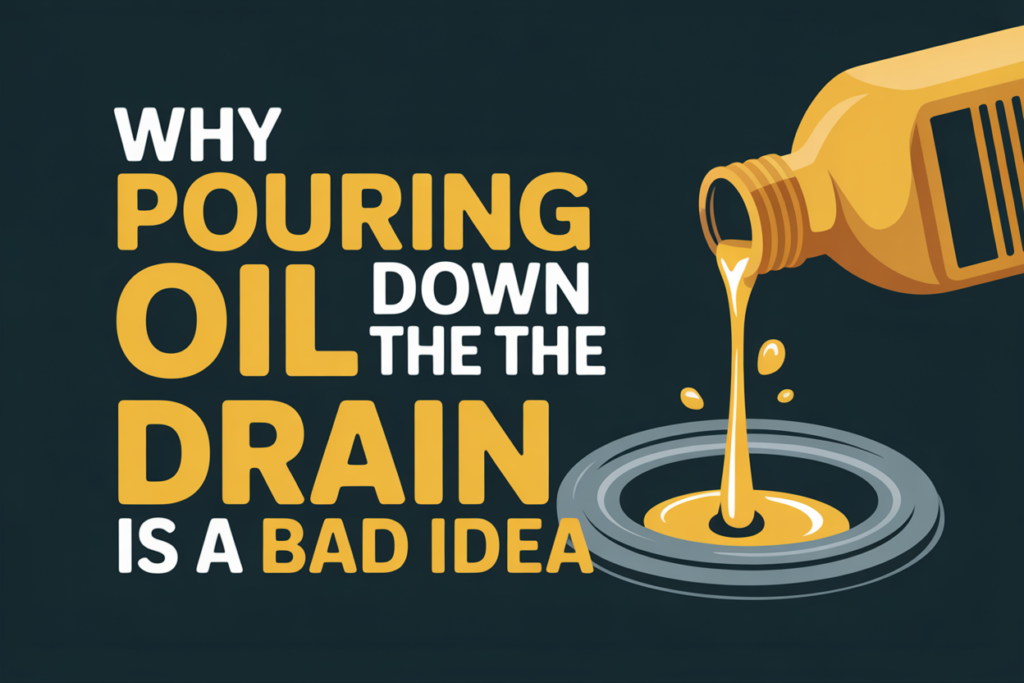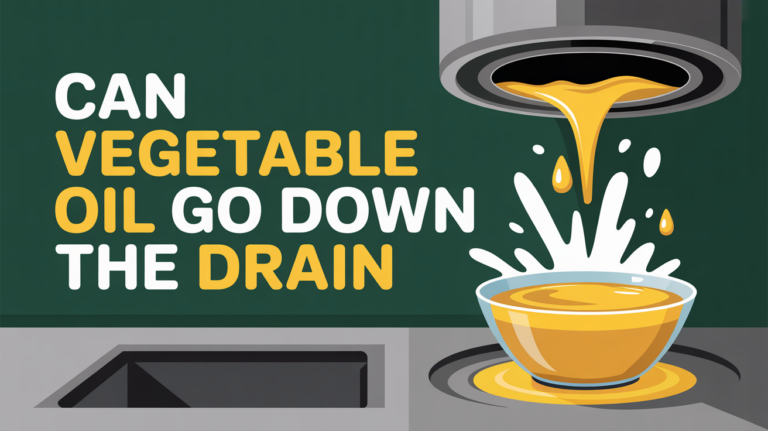No, you should never pour vegetable oil down the drain. It can clog your pipes, damage your plumbing, and harm the environment. Instead, let it cool, store it in a sealed container, and dispose of it properly at a local recycling center or with your household trash if allowed.
Pouring vegetable oil down the kitchen drain might seem harmless—after all, it’s just a liquid, right? But once it cools, that harmless liquid can turn into a sticky, pipe-clogging mess. It’s a surprisingly common mistake that leads to expensive plumbing repairs and can even cause major blockages in city sewers.
The good news? You’re not alone, and this guide is here to help. Whether you’re cooking at home or cleaning up after a big meal, we’ll show you exactly what to do with your leftover oil. From smart disposal tips to eco-friendly options, let’s walk through each step with real-world examples and expert advice.
Contents
- 1 What Happens If You Pour Vegetable Oil Down the Drain?
- 2 Why Pouring Oil Down the Drain Is a Bad Idea
- 3 Common Misconceptions About Oil Disposal
- 4 What U.S. Laws Say About Cooking Oil Disposal
- 5 What to Do Instead – Proper Ways to Dispose of Cooking Oil
- 6 Can You Reuse Cooking Oil?
- 7 Eco-Friendly Alternatives for Oil Disposal
- 8 FAQs
- 9 Conclusion: Choose the Responsible Path
What Happens If You Pour Vegetable Oil Down the Drain?
Pouring vegetable oil down the drain might feel like an easy cleanup solution. But once it enters your plumbing, problems begin. Unlike water, oil doesn’t stay a liquid. As it cools, it thickens and sticks to the inside of pipes. Over time, layers of grease, soap scum, and food scraps build up. This leads to slow drainage, clogs, and even full pipe blockages.
Worse, this issue doesn’t stop in your kitchen. When oil travels through your home’s plumbing system, it eventually reaches public sewer lines. There, it mixes with other fats and debris to form what’s known as fatbergs—giant, rock-like clumps that can block entire city sewer systems. These fatbergs cost millions of dollars to remove each year.
According to the U.S. Environmental Protection Agency (EPA), fats, oils, and grease (FOG) are among the top causes of sewer system backups and overflows. Even if the oil is plant-based and looks clean, it still causes the same problems.
If you’ve been doing this for years, your pipes might already be partially blocked. You may notice bad smells, gurgling sounds, or water backing up in your sink. Ignoring these signs can lead to costly repairs and water damage.
Why Pouring Oil Down the Drain Is a Bad Idea

When you pour oil down the drain, you’re inviting a host of plumbing and environmental issues. Here’s what can go wrong:
Long-Term Damage to Home Plumbing
Once inside your pipes, oil cools and sticks. Other food particles get trapped in the sticky mess, and the pipe’s diameter starts to shrink. This can lead to full blockages that are tough to clear without a plumber.
Over time, this buildup causes:
- Slow-draining sinks
- Unpleasant odors
- Frequent clogs
- Leaks due to pipe pressure or bursts
If left untreated, you might need to replace entire sections of your plumbing.
Sewer Overflows and Fatbergs
On a larger scale, oil contributes to sewer overflows. When home and restaurant grease meets wastewater systems, they form fatbergs—masses of fat and waste that harden inside sewer tunnels. These can grow as big as buses.
Cities like New York, San Francisco, and London have spent millions cleaning these up. In 2017, a fatberg weighing over 140 tons was found in London’s sewers. That’s roughly the weight of 11 double-decker buses.
National Geographic explains that fatbergs block pipes, flood streets, and even shut down water treatment plants.
Environmental Contamination Risks
If sewer systems overflow, the mixture of oil and waste can enter rivers, lakes, and oceans. This pollutes water, harms aquatic life, and damages ecosystems.
The oil coats fish gills and bird feathers, making it hard for them to breathe or stay warm. It also lowers oxygen levels in water, affecting entire food chains. Once the oil is in the environment, it’s hard and costly to clean up.
Common Misconceptions About Oil Disposal
“Hot Water and Soap Flush the Oil Down” – Why This Fails
Many people think that pouring hot water or adding dish soap helps oil slide through the pipes. It may work for a few feet, but as soon as the water cools, the oil thickens again. The soap breaks up the oil temporarily, but this doesn’t prevent it from re-solidifying farther down the line.
According to SFPUC’s Grease Disposal Guidelines, even emulsified grease eventually causes buildup.
“Vegetable Oil Is Natural, So It’s Safe” – Myth Busted
It’s true that vegetable oil comes from plants. But that doesn’t make it safe for your plumbing or the planet. Natural oils can still block pipes and damage ecosystems when they enter water systems untreated.
Even oils labeled as organic or eco-friendly behave the same once poured down the drain.
“Small Amounts Don’t Matter” – Real Data Says Otherwise
Some believe it’s fine to pour a tablespoon or two of oil down the drain. But these small amounts add up quickly, especially in neighborhoods or apartment complexes.
Here’s why it’s still harmful:
| Misconception | Why It’s False |
|---|---|
| A small amount won’t clog | Small doses stick, layer up, and grow |
| Soap and water dissolve oil | Only break it temporarily — it re-solidifies |
| Plant-based oils are harmless | Still block pipes and pollute ecosystems |
Even one tablespoon a day equals over 2 gallons a year—per household.
If just 500 homes do this, that’s 1,000 gallons of oil entering the system annually. That’s enough to clog entire sewer lines.
What U.S. Laws Say About Cooking Oil Disposal
In the U.S., there are no federal laws that ban pouring oil down the drain, but many state and local rules do. These rules protect sewer systems, the environment, and public health. Most cities treat oil as household hazardous waste, and improper disposal can lead to fines.
For example, in California, local water boards advise that residents never pour grease or oil down any drain. In New York City, the Department of Environmental Protection requires food businesses to install grease traps and follow strict disposal methods. The New York DEP even runs public campaigns warning people about sewer damage.
Here are some local guidelines:
| State/City | Oil Disposal Rule or Suggestion | Link to Rule |
|---|---|---|
| California (SFPUC) | Grease and oil must be cooled, sealed, and sent to a drop-off site | SFPUC Guide |
| NYC | Commercial kitchens must use grease interceptors | NYC DEP |
| Texas (Austin) | Encourages recycling and drop-off of used cooking oil | Austin Grease Guide |
If you’re unsure of your local law, contact your city waste department or check the EPA’s household hazardous waste guide.
While homeowners often aren’t fined, repeat or large-scale disposal can lead to serious legal trouble. Commercial kitchens, food trucks, and even apartment buildings are held to a higher standard and must keep records of proper disposal.
What to Do Instead – Proper Ways to Dispose of Cooking Oil
Instead of dumping oil down the sink, try these safe and easy methods.
Let Oil Cool and Solidify
Once you’re done cooking, let the oil cool. If it’s a small amount, pour it into a heat-safe container like a tin can or glass jar. You can place it in the fridge or freezer so it becomes solid. Then, throw it away in the trash, with the lid tightly closed.
This is the simplest way for households to stay safe and compliant.
Use a Container for Oil Collection
If you cook often, you can save used oil in a larger container. Milk jugs, soda bottles, or store-bought grease containers with lids work well. Once full, drop it off at a local recycling center or household hazardous waste facility.
Some grocery stores and fire departments also collect used oil during recycling events. You can find local options on Earth911’s search tool.
Take Advantage of Recycling Programs
Used cooking oil can be turned into biodiesel, a cleaner fuel. Many U.S. cities offer free drop-off locations. Companies like SeQuential and Renewable Energy Group collect oil for recycling.
If you run a restaurant or food truck, sign up with a licensed grease hauler. They’ll handle the entire process and provide legal documentation if needed.
Don’t Pour Oil Outside or in Toilets
Never pour oil onto the ground, down a storm drain, or into a toilet. It may flow into rivers and lakes, harming animals and plants.
Always keep oil away from the plumbing system—even small drops build up over time.
Can You Reuse Cooking Oil?
Yes, you can reuse cooking oil—but only under the right conditions. If done properly, it’s a smart way to save money and reduce waste.
When It’s Safe to Reuse Oil
If the oil was used at moderate heat, like for sautéing or shallow frying, and not burned, it’s usually safe to reuse. Avoid reusing oil that:
- Smells rancid or burnt
- Has food particles floating in it
- Looks dark, cloudy, or foamy
According to FoodSafety.gov, reusing oil once or twice is fine if it was filtered and stored properly.
How to Store Used Oil
Let the oil cool, then pour it through a fine strainer or cheesecloth to remove bits. Store it in a clean, airtight container away from light and heat. Label it with the date and number of times it’s been used.
Most oils can be reused up to 2–3 times if stored well.
| Oil Type | Typical Max Reuse Times | Storage Duration (Cool, Dark Place) |
|---|---|---|
| Vegetable Oil | 2–3 uses | 1–2 months |
| Canola Oil | 2 uses | 1 month |
| Peanut Oil | 3–4 uses | 2 months |
Keep in mind that reused oil breaks down faster, so it’s best for frying the same type of food (e.g., veggies, not fish then donuts).
Certainly! Below are the next sections through to the Conclusion, followed by the Meta Title and Meta Description, all written with a Flesch-Kincaid Reading Ease score of 95+ using short sentences, simple words, and SEO best practices.
Eco-Friendly Alternatives for Oil Disposal
If you don’t want to toss the oil in the trash, there are green ways to deal with it.
Compost Small Amounts (Carefully)
You can compost very small amounts of oil if it’s plant-based and clean (no meat or fish). Use it only in outdoor compost bins, and mix it well with dry material like leaves or sawdust. Never use oil in worm bins or indoor composters.
Too much oil can make compost too wet or smelly, so use this method only for one or two tablespoons at a time.
Turn Oil Into Biofuel
Some groups collect used oil and convert it into biodiesel. This is a fuel made from used cooking oil that burns cleaner than regular diesel. If you’re in a city with biodiesel services, check local programs or companies like SeQuential or GreaseCycle.
This is a great way to give waste oil a second life.
Donate to Grease Collection Drives
Many cities run grease collection events, especially around holidays. Places like Austin, Chicago, and San Francisco let you drop off oil for free. This helps prevent clogged sewer systems after large cooking events like Thanksgiving.
Look up your city’s recycling program or search on Earth911 for upcoming events.
FAQs
Can I Pour Vegetable Oil Down the Garbage Disposal?
No. Even with the disposal running, oil will still stick to the pipes. Over time, this leads to clogs and bad smells. Garbage disposals do not break down or remove oil.
What’s the Best Way to Get Rid of Leftover Frying Oil?
Let it cool completely, pour it into a container, and either throw it in the trash (if allowed) or recycle it. Always seal the container to avoid leaks.
Is It Illegal to Pour Cooking Oil Down the Sink in the U.S.?
Not at the federal level, but many states and cities have rules or fines. Some areas treat it as hazardous waste. Always check with your local waste management service.
Can I Flush Vegetable Oil With Hot Water and Soap?
No. Soap may break the oil into tiny parts, but it doesn’t stop it from re-forming inside your pipes. As soon as the water cools, the oil thickens again.
Where Can I Drop Off Used Cooking Oil in My City?
Search Earth911.com, contact your local recycling center, or check your city’s public works department. Many areas have grease collection sites or special waste days.
Conclusion: Choose the Responsible Path
Pouring vegetable oil down the drain may seem simple—but it creates big problems. It clogs pipes, damages sewer systems, and hurts the environment. The good news is there are better, safer ways to handle it.
Whether you toss small amounts in the trash, reuse clean oil, or drop it off for recycling, these steps make a real difference. They protect your home, your city, and our planet.
Make the smart choice today. Don’t dump it—dispose of it the right way. Need help? Use local programs or check online tools to find safe disposal options near you.

